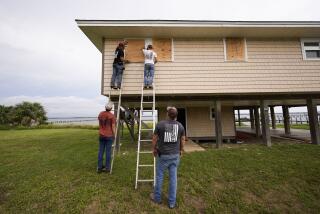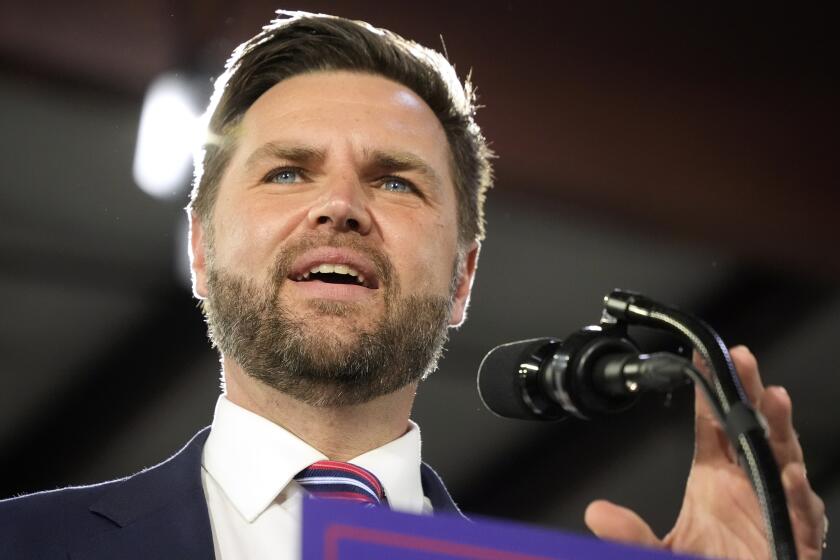Joint U.S.-Iraqi Patrols Are Getting Off on Wrong Foot
The squad of U.S. soldiers waited impatiently to embark on a joint foot patrol with Iraqi police last week through the streets of this hostile city.
Military commanders hoped the sight of Americans and Iraqis walking side by side would symbolize the start of the transfer of control over security back to Iraqis.
The Iraqis didn’t see it that way. Loath to be seen marching through their hometown with heavily armed Americans, none of them showed up.
“Is this a joint patrol, or what?” Capt. Chris Solinsky, the patrol leader, said into his shortwave radio. “Where are the Iraqis?”
Ten minutes later, eight unhappy-looking police officers joined the U.S. squad and reluctantly began the patrol.
“Great,” Solinsky said dryly. “Sovereignty is bringing us together.”
After that, it was a game of red-light-green-light, with the Iraqis staying at least 20 feet away from the U.S. soldiers. When the Americans stopped to allow the Iraqis to catch up, the Iraqis would stop too.
The Iraqis don’t want to appear to be working for the Americans, and they also know that being next to a U.S. soldier can be dangerous. Two Americans were killed two weeks ago while on patrol in Baqubah.
When Solinsky suggested that a couple of the Iraqi officers split off down a side street, all eight disappeared down the road.
“Most of my guys would prefer to do this alone,” said Lt. Col. Assaf Kamel, leader of the patrol’s Iraqi contingent. “And the people of the city would rather see us do it alone.”
With the political hand-over complete, U.S. military leaders are shifting their efforts to transferring control over Iraq’s security to the nation’s fledgling police forces.
Under a United Nations resolution, the U.S. remains the ultimate power for protecting Iraq, but military leaders hope to shift that responsibility to Iraqi police and the Iraqi National Guard over the next three to six months. The first step is incorporating Iraqi forces into the U.S.-led coalition’s activities and increasing the number of joint operations, such as the foot patrol.
But as the Americans and Iraqis in Baqubah are learning, sharing a job can be more complicated than doing it alone. The evolving relationship between U.S. troops and Iraqi security forces is fraught with mutual frustration, miscommunication and misunderstandings.
“I really want to reduce our presence in the city. We are assuming an advisory role, a support role,” said Col. Dana Pittard, commander of the 1st Infantry Division’s 3rd Brigade Combat Team in Baqubah. “But at the same time, we’re not going to let this place turn into a Fallouja,” he added, referring to the insurgent stronghold where Marines withdrew after a bloody siege. The hand-over of security responsibilities comes at a time of escalating violence by insurgents in Baqubah, a city in the so-called Sunni Triangle north of Baghdad. In June, more than 165 roadside bombs were uncovered in the region, the highest number in Iraq, Pittard said. One such bomb, which was defused, was made from 500 pounds of TNT, enough to destroy a Bradley fighting vehicle.
Foreign fighters are also believed to have infiltrated the city. U.S. intelligence indicated that Jordanian-born fugitive Abu Musab Zarqawi, whom U.S. leaders have labeled the mastermind of a wave of attacks in Iraq, was in Baqubah sometime over the last 10 days, Pittard said.
In an effort to bolster local forces, Pittard took the unprecedented step last week of arming local police officers with rocket-propelled-grenade launchers. Iraqi police requested the weapons, saying they needed to be at least as well armed as the insurgents.
“It’s weird to see police walking around with RPGs on the shoulder, but it’s given them more confidence to stay and fight,” said Sgt. Richard St. Clair of the 3rd Brigade Combat Team.
In the coming months, Pittard plans to include Iraqis in all patrols. His boss, Maj. Gen. John Batiste, has set a tentative target date of October to transfer day-to-day responsibility for security to Iraqis.
Toward that aim, U.S. soldiers and Iraqi police in Baqubah last week launched one of their first post-occupation missions: a late-night raid on a village in a palm grove south of the city.
Iraqi Gen. Walid Khalid, who oversees police in Baqubah and the larger Diyala province, picked up a tip that foreign fighters were hiding in some houses in the village. The Americans organized a raid with about 80 soldiers and four Bradley fighting vehicles. Three Iraqi police officers were ordered to participate.
When soldiers arrived at the first house, they broke down the front door, handcuffed bleary-eyed residents and ordered them at gunpoint into the front yard for questioning.
“OK, just tell them what we’re doing here,” a U.S. soldier told one of the Iraqi policemen, who was also serving as interpreter.
The policeman -- wearing a black ski mask to hide his identify -- paused for a moment, and then asked the soldier, “What are you doing here?”
“Searching for foreign fighters!” the exasperated soldier shot back.
An hour later, more than 15 homes had been searched and no foreigners were found.
“It looks like we’ve got some bad intelligence here,” Capt. Ty Johnson, leader of the Brigade Reconnaissance Troop, radioed his commanders back at the U.S. base. “I suggest we finish up and leave. We’re going to end up pissing the town off and making these people into insurgents.”
Once the raid turned sour, some finger-pointing began. Iraqis characterized the raid as U.S.-led. The police chief said he had learned about the details only a few hours earlier.
When the searches came up dry, Johnson said it was the Iraqis who were in charge.
“This was their information,” he said. “They are the ones really leading this.”
U.S. soldiers said it was possible that foreign fighters had been tipped off about the raid, perhaps by a corrupt Iraqi policeman. Such concerns explain why U.S. soldiers don’t always fully brief their Iraqi partners about missions ahead of time.
“Most of these guys are good cops, but sometimes you get a bad cop,” said 1st Lt. Chris Boggian of the Brigade Reconnaissance Troop.
Khalid, the police chief, has forged a close relationship with U.S. soldiers. He has conducted more than two dozen operations with the troops and consults several times a day with American officers about security threats.
Khalid has paid a price for his ties with the U.S. military. He has been the target of numerous assassination attempts. A rocket landed next to his desk one day, and he uses the charred shell as a flower vase. During a series of attacks June 24, insurgents set fire to his house.
At the same time, however, the police chief said it was time to do fewer joint operations, not more.
“I’d rather do my own operations,” he said. “The Iraqi police need to start depending upon themselves.”
He said he was comfortable with the U.S. military continuing its operations but that he was planning to increase his own all-Iraqi missions beginning this month.
At times, he said, power-sharing can lead to confusion.
When the U.S. military offered to send tanks to rescue the police chief during the attack on his house, Khalid declined. “It was important to show that I can count on my own officers,” he said.
But in the chaotic hours during the attack, the police chief’s convoy was stopped at gunpoint by U.S. soldiers who didn’t recognize him. Khalid found himself with his arms raised above his head, shouting, “Don’t shoot! I’m the police chief!”
Baqubah has been a testing ground of sorts for joint operations. More than 100 U.S. soldiers have been living inside the city’s main police station for nearly a year. They’ve set up one of the first so-called joint coordination centers, where Iraqis and Americans gather each morning to share intelligence and strategize about security efforts. Now the centers are being duplicated all around Iraq.
“Once we transfer control to the new Iraqi security forces, the centers will be the backstop,” said Batiste, the commander of the 1st Infantry Division. “That’ll be where they can get ahold of us and quickly get assistance if they need it.”
But in Baqubah, the Americans have found that there are limits to how much can be shared. The center is actually two rooms. One is for Iraqis and includes a big conference table, a large map, a television and several 911-type emergency telephone lines.
Behind a door marked “restricted access” is the Americans’ room.
“We have to share, but we can’t give them access to everything we know,” said Kreg Schnell, intelligence officer of the 3rd Brigade Combat Team.
Trust will grow as both sides work together, Pittard said. “It’s a process,” he said. “It’s going to come in stops and starts.”
The colonel learned that lesson first-hand last week when he led a raid on a suspected cell leader’s house north of Baqubah, based on a tip from the Iraqi National Guard.
Dozens of troops with night-vision goggles and M-16 rifles broke through the windows and ordered a terrified family to lie on the floor. Within minutes, soldiers had determined that they had invaded the house of a Kurdish schoolteacher, not a suspected terrorist leader. Afterward, Pittard quietly fumed in front of the house, saying he regretted using such heavy force and lamenting the bad intelligence.
“We have to find a way to hold these guys accountable for the information they provide,” Pittard said. “It’s not been a good morning.”
More to Read
Sign up for Essential California
The most important California stories and recommendations in your inbox every morning.
You may occasionally receive promotional content from the Los Angeles Times.










